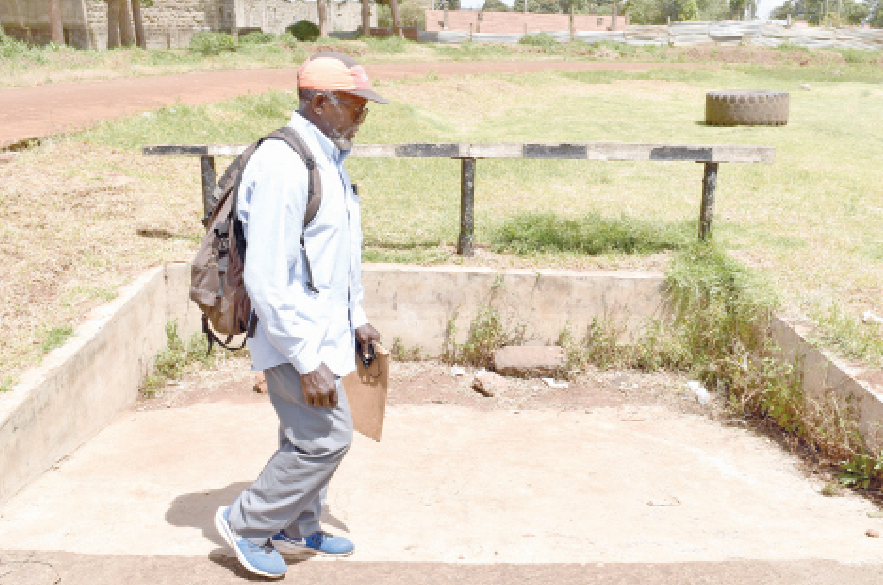Legendary coach Simba yearns for return of glory days in Nyahururu hub

The name Jimmy Simba Beauttah aka Coach Simba might not ring a bell in the ears of today’s athlete but his name will forever be etched in history books of athletics in this country and beyond.
Before settling on coaching in athletics in 1970s, Simba was a jack of all trades – a former boxer, karateka, musician and Kenya Navy officer.
His midas touch in conditioning athletes saw him produce eight World Championship medals, three Olympic medals and two Commonwealth Games medals before ‘retiring’.
Spotting white silvery beards, a cap and spectacles, the legendary coach nostalgically looks back for the days when an athletic competition in Kenya was a crowd puller.
“We need to work on making athletics exciting again so that we can bring back the spectators,” he said and urged runners to strive to be brands that can attract large following.
He joined Kim McDonald’s training camp in Nyahururu in 1995 after leaving Navy, where he transformed runners to world class level enabling them to become World champions in track, cross country and road running. Briton Kim McDonald who died at the age of 45 in 2001 was an athletics manager.
He transformed the likes of Moses Kiptanui (3000m Steeplechase world number one 1991-1995) and Daniel Komen (5000m World Champion in Athens, 1997) into world-beaters. The two are currently business moguls in Eldoret ‘the home of champions’.
In 1995, the two were first athletes to run 5000m under 13 minutes. Kiptanui was also the first to run 3000m steeple chase under eight minutes.
Speaking exclusively to People Daily Sport in Nyahururu, Beauttah felt sorry that the high altitude Nyahururu stadium last saw a new layer of murrum 30 years ago.
“This is the stadium that gave this country its only ever Olympic 10,000m gold medal through Naftali Temu who trained here with the rest of the team members for the 1968 Games in Mexco but nobody sees the need to keep it in good condition for athletes top train well,” he said.
After leaving the coaching job following death of Kim and subsequence disintegration of the athletes’ legion, the father of four retreated to his Mombasa home for a while before returning to athletics as a Technical Director at the IAAF Kip Keino High Performance Training Centre in Eldoret.
It is in this Camp that such world beaters like Asbel Kiprop the 1500m Beijing Olympic gold medallist, Daniel Kipchirchir Komen (1500m World Champion in 2007, Osaka), Athens Olympic 3000m steeplechase gold medalist and multiple World champion Ezekiel Kemboi, middle distance star Janeth Jepkosgei – the first Kenyan woman to win the world 800 metres title in Osaka and Sudan’s Olympic 800m finalist Ismail Ahmed Ismail found their footing in athletics.
Beauttah will never end his talk on athletics without mentioning Joseph Ebuya, a young man who used to sell charcoal using a bicycle in Nyahururu. They developed a rapport when the young expressed his interest in taking up athletics.
“After I gave him training shoes, he would park his bicycle against the stadium’s inner perimeter wall and join us for training. He went on to become World Cross Country champion (2010) in Bydgoszcz, Poland,” Beauttah said.
Beauttah says it is unfortunate that athletes are trooping from Nyahururu to Iten in in Elgeyo Marakwet County unlike during his days when it was vice versa.
“Nyahururu was the place to train not just for Kenyans but even foreigners like the German national athletics team that used to camp at the Thomson Falls Lodge, to prepare for major championships, bringing a lot of business to the town,” he said adding that
John Yuda from Tanzania also trained here when he won silver for his country in the World Cross Country Championship in Dublin, Ireland in 2002 behind Kenenisa Bekele of Ethiopia.
His challenge to the current crop of coaches and athletes is to invent new ways of making the athletics enjoyable again by “enjoying it themselves first”. Beauttah said he is ready and available for consultation on how to motivate athletes to enjoy the sport.
The iconic coach blames greed for the upsurge in doping in the country saying many athletes want to achieve great wealth by cutting corners.
“They want to make a lot of money by doping without knowing that all the money they make will be eaten by their bodies (through treatments) when they retire,” he cautions.












